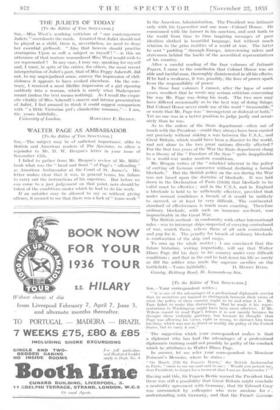WALTER PAGE AS AMBASSADOR
[To the Editor of THE SPECTATOR.] SIR,—The subject may be of sufficient importance, alike to British and AMerican readers of The Spectator, to allow a rejoinder to Mr. D. W. Brogan's letter in your issue of November tali.
I failed to gather from Mr. Brogan's review of Mr. Millis' book what was the " head and front " of Page's " offending " as American Ambassador at the Court of St. James's. His letter makes clear that it was, in general terms, his failure to carry out the instructions of his superiors. But before we can come to a just judgement on that point, note should be taken of the conditions under which he had to do his work.
If an outsider may be allowed to say so without giving offence, it seemed to me that there was a lack of " team wink "
in the American Administration. The 'President was intimate only with his typewriter and one man—Colonel House. He communed with the former in his sanctum, and sent forth to the world from time to time inspiring messages of pure idealism clothed in beautiful language, but without much relation to the grim realities of a world at war. The latter he sent " padding " through Europe, interviewing rulers and statesmen behind the backs of the accredited representatives of his country.
After a careful reading of the four volumes of Intimate Papers, I came to the conclusion that Colonel House was an able and tactful man, thoroughly disinterested in all his efforts. If he had a weakness, it was, possibly, the love of power apart from the responsibility of power.
In those four volumes I cannot, after the lapse of some years, recollect that he wrote any serious criticism concerning the way Mr. Page was doing his work. The two men may have differed occasionally as to the best way of doing things. But Colonel House never made use of the word " treasonable," or wrote that Mr. Page was " incompetent or disloyal or both." Yet no one was in a better position to judge justly and accur- ately than he was.
As to the orders of the State department—often out of touch with the President—could they always have been carried out precisely without risking a war between the U.S.A., and Great Britain, which would have been a disaster to the world, and not alone to the two great nations directly affected ? For the first two years of the War the State department clung to a theory of the " Freedom of the Seas " quite inapplicable to a world-war under modern conditions.
Mr. Brogan writes of the " mischief inherent in the policy of cutting off German commerce without declaring a formal blockade." But the British policy on the sea during the War was not based upon the doctrine of blockade. It was laid down in the Declaration of Paris (1856) that blockade to be valid must be effective • and in the U.S.A. and in England a blockade is held to be sufficiently effectiVe, proVided that under normal conditions a breach of it would be unlikely to succeed, or at least be very difficult. • The continental standard of effectiveness is much more exacting. Therefore ordinary blockade, with such an immense sea-front, was impracticable in the Great War.
The British method—in conformity with other international rules—was to intercept ships suspected of carrying contraband of war, search them, relieve them of all such contraband, and pay for it. The penalty for breach of ordinary blockade is confiscation of the ship and cargo.
To sum up the whole matter I am convinced that the future historian, writing impartially, will say that Walter Hines Page did his duty to his country under very difficult conditions ; and that in the end he laid down his life as surely as did the soldier who made the supreme sacrifice on the






























































































 Previous page
Previous page